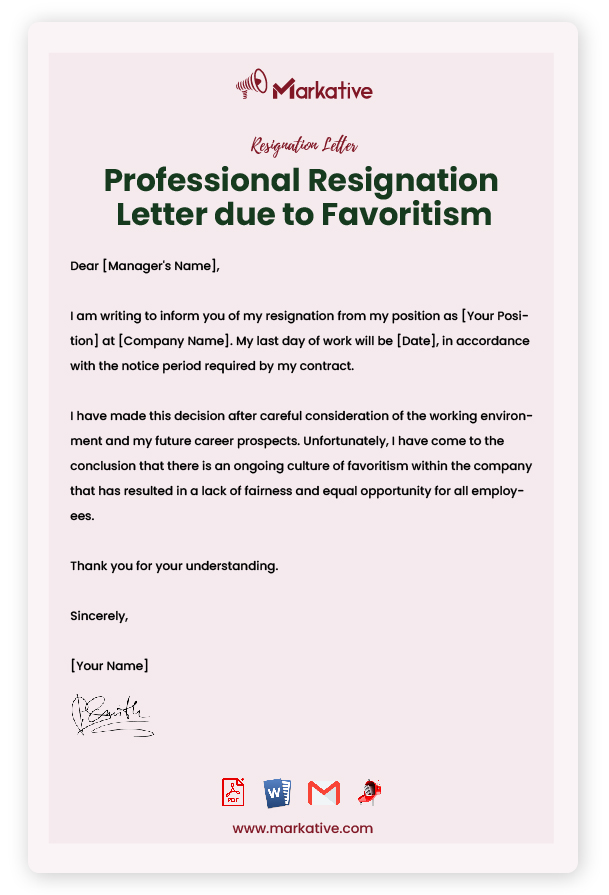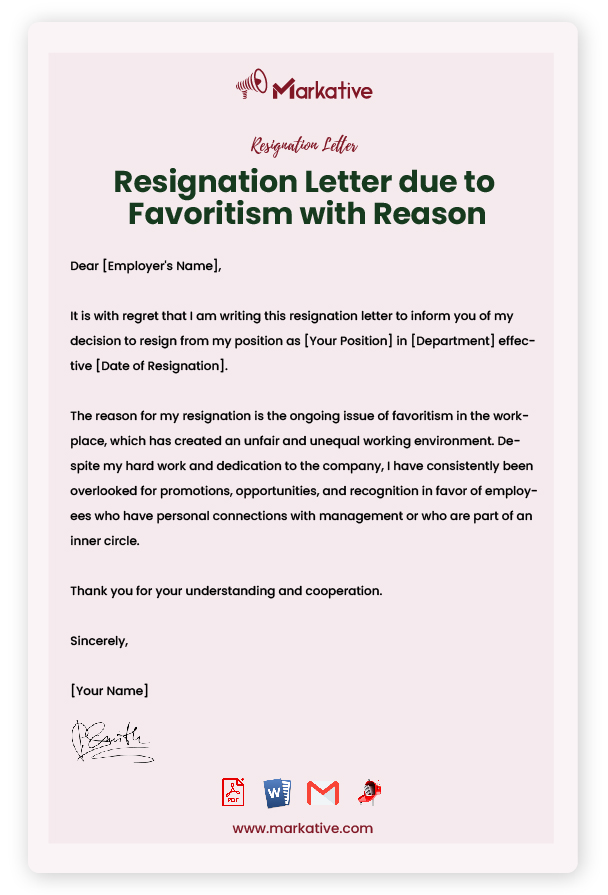Resignation Letter due to Favoritism, significant decision that can be prompted by various reasons. One of the most common reasons is favoritism in the workplace. When an employee perceives that their manager is playing favorites, it can create a toxic work environment and undermine employee morale. In such cases, an employee may feel the need to resign in order to escape the situation.
Resignation is an essential process that requires careful consideration and planning. It is important to resign in a professional manner that maintains a positive relationship with the employer and colleagues. A well-crafted resignation letter can help an employee to leave on good terms and preserve their professional reputation.
In this article, we will explore the topic of Resignation Letter due to Favoritism and provide tips on how to write an effective resignation letter. We will discuss why it is important to resign gracefully, how a good resignation can create a positive impact, and what to include in a resignation letter. Whether you are currently facing favoritism at work or just want to be prepared for future job transitions, this article will provide valuable insights and advice.
How To Write Appealing Resignation Letter due to Favoritism?
Writing a resignation letter can be challenging, especially when the reason is favoritism. However, a well-crafted resignation letter can help you maintain a professional relationship with your employer and leave on a positive note. Here are five steps to help you write an appealing resignation letter due to favoritism, with examples.
Step 1: Be clear and concise in your opening statement. Example: I am writing this letter to inform you of my resignation, effective two weeks from today, due to the favoritism that has been present in the workplace.
Step 2: State the reason for your resignation, focusing on the favoritism issue. Example: I feel that the favoritism in the workplace has led to an unfair work environment that is not conducive to my personal and professional growth.
Step 3: Express your gratitude for the opportunities and experiences gained during your time with the company. Example: I appreciate the opportunities and experiences gained while working at this company, and I will always remember them with fondness.
Step 4: Offer to assist with the transition process and ensure a smooth handover of responsibilities. Example: I am willing to assist with the transition process to ensure that my responsibilities are handed over smoothly to my successor.
Step 5: Close with a professional and courteous statement. Example: Thank you for the opportunities provided during my tenure with the company, and I wish you all the best in your future endeavors.
Conclusion: Writing an appealing resignation letter due to favoritism requires a delicate balance of expressing your concerns while maintaining a professional tone. By following these five steps, you can craft a resignation letter that will help you leave on a positive note and maintain a professional relationship with your employer.

Professional Resignation Letter due to Favoritism
[Your Name] [Your Address] [City, State ZIP Code] [Email Address] [Date] [Manager's Name] [Manager's Title] [Company Name] [Company Address] [City, State ZIP Code] Dear [Manager's Name], I am writing to inform you of my resignation from my position as [Your Position] at [Company Name]. My last day of work will be [Date], in accordance with the notice period required by my contract. I have made this decision after careful consideration of the working environment and my future career prospects. Unfortunately, I have come to the conclusion that there is an ongoing culture of favoritism within the company that has resulted in a lack of fairness and equal opportunity for all employees. I have witnessed numerous instances where certain individuals have been given preferential treatment over others, resulting in unequal treatment and opportunities for career advancement. Despite raising these concerns with my supervisor and HR department, I have not seen any significant action taken to address this issue. As a professional, I cannot continue to work in an environment that does not value fairness, integrity, and equal opportunity for all employees. I have always upheld these values in my personal and professional life and cannot compromise them for any reason. I want to thank you and the entire team for the opportunity to work with such a great organization. I have learned a lot during my time here and have made many valuable connections. I wish the company all the best in its future endeavors. Please let me know what further steps I need to take before my last day of work. I will ensure that all pending tasks and projects are completed to the best of my ability before I leave. Thank you for your understanding. Sincerely, [Your Name]
Resignation Letter due to Favoritism with Reason
[Your Name] [Your Address] [City, State ZIP Code] [Your Email] [Date] [Employer's Name] [Company Name] [Address] [City, State ZIP Code] Dear [Employer's Name], It is with regret that I am writing this resignation letter to inform you of my decision to resign from my position as [Your Position] in [Department] effective [Date of Resignation]. The reason for my resignation is the ongoing issue of favoritism in the workplace, which has created an unfair and unequal working environment. Despite my hard work and dedication to the company, I have consistently been overlooked for promotions, opportunities, and recognition in favor of employees who have personal connections with management or who are part of an inner circle. I believe that such practices are not only unethical but also undermine the values of fairness, meritocracy, and teamwork that are essential for the success of any organization. As a result, I find it increasingly difficult to continue working in such an environment, which has negatively impacted my morale, motivation, and job satisfaction. I want to emphasize that my decision to resign is not based on any personal animosity or grievances towards anyone in the company. On the contrary, I have always tried to maintain a positive and professional attitude and to contribute to the best of my abilities. However, I feel that my potential and contributions are not being recognized or rewarded fairly, which has affected my career growth and development. I would like to express my gratitude for the opportunities and experiences that I have gained during my tenure at the company. I have learned a lot and worked with some amazing colleagues who have made my time here enjoyable and memorable. I wish the company continued success and growth in the future. Please let me know if there are any formalities or procedures that I need to follow before my departure. I will do my best to ensure a smooth transition and to complete any pending tasks or projects to the best of my abilities. Thank you for your understanding and cooperation. Sincerely, [Your Name]
Resignation Letter due to Favoritism without Reason
[Your Name] [Your Address] [City, State ZIP Code] [Your Email] [Date] [Employer’s Name] [Company Name] [Address] [City, State ZIP Code] Dear [Employer’s Name], I am writing to formally submit my resignation from my position as [Your Position] at [Company Name]. My resignation will be effective in [Notice Period], starting from today’s date [Current Date]. I have enjoyed working with [Company Name] and appreciate the opportunities and experiences that the company has provided me during my tenure here. However, I have decided to resign due to the unfair treatment that I have experienced during my time at the company. I have noticed a consistent pattern of favoritism without any reasonable basis, which has made it difficult for me to continue working here. This situation has caused me significant stress and has impacted my motivation and job satisfaction. I believe that a fair and impartial workplace is crucial for the success of any organization, and unfortunately, I have not experienced that at [Company Name]. While I appreciate the support and guidance provided by my colleagues and supervisors, I can no longer continue in a workplace that does not value fairness and equity. I would like to express my gratitude to [Employer’s Name], my colleagues, and my team for the opportunities and support that they have provided me during my tenure at [Company Name]. I will ensure a smooth transition for my replacement during my notice period. Thank you for your understanding in this matter. Sincerely, [Your Name]
Urgent Resignation Letter due to Favoritism Sample
Dear [Manager's Name], It is with a heavy heart that I am submitting my resignation from my position at [Company Name], effective immediately. Over the past few weeks, I have become increasingly disheartened by the apparent favoritism that has been displayed within our team. As you are aware, I have raised concerns about the preferential treatment that certain employees have received, despite their lack of qualifications or work ethic. Despite my efforts to address these issues through appropriate channels, nothing has been done to rectify the situation. As a result, I can no longer continue to work in an environment that condones such unfair and unethical practices. It is deeply disappointing to me that my time at [Company Name] has ended in this way. I have greatly enjoyed working with many of my colleagues and have appreciated the opportunities that this position has afforded me. However, I can no longer compromise my principles or integrity in the face of such blatant injustice. I wish you and the rest of the team all the best for the future. Thank you for the experience and the opportunity to be a part of the company. Sincerely, [Your Name]
Simple Resignation Letter due to Favoritism
Dear [Manager's Name], Please accept this letter as my formal resignation from my position at [Company Name]. I am sorry to inform you that I have decided to resign due to the issue of favoritism that I have observed in the workplace. As you know, I have been with the company for several years and have always worked diligently to contribute to its success. However, I have noticed that some employees are being favored over others, despite their lack of qualifications or effort. This has created an unfair and demotivating work environment, and I cannot continue to work under such circumstances. I want to take this opportunity to thank you for the opportunities you have given me during my time here, and for your support and guidance throughout. I have enjoyed working with my colleagues and will always be grateful for the experiences I gained while working at this company. I will do my best to ensure a smooth transition during my remaining time here and will complete all tasks assigned to me before my departure. Thank you again for everything. Sincerely, [Your Name]
How Much Notice Should You Give for a Resignation Letter due to Favoritism?
According to a survey conducted by Glassdoor, 60% of employees who believe that favoritism exists in their workplace are actively looking for a new job. Furthermore, 26% of employees have personally experienced favoritism at work. The effects of favoritism can be detrimental to morale, job satisfaction, and overall productivity in the workplace. It can also lead to high turnover rates and difficulty in retaining talented employees.
When it comes to resigning due to favoritism, it is recommended to provide a standard notice period of at least two weeks. This is considered a professional and courteous approach, and it allows the company to make arrangements to replace you and ensure a smooth transition. However, if the situation is particularly severe, and you feel uncomfortable or unsafe in the workplace, it may be appropriate to resign immediately. In this case, it is best to communicate your reasons clearly and professionally in your resignation letter and try to give your employer as much notice as possible under the circumstances.

Is it Ok To Email a Resignation Letter due to Favoritism?
While it is not ideal, it is acceptable to email a resignation letter if you feel that you are being treated unfairly due to favoritism in the workplace. It’s important to maintain a professional tone and be clear about the reasons for your resignation. For example, you might say something like, “I am resigning from my position effective immediately due to the ongoing favoritism and lack of equal treatment in the workplace.” It’s also a good idea to have a face-to-face conversation with your supervisor or HR representative before sending the email, if possible.
Common Mistakes When Writing a Resignation Letter due to Favoritism?
- Being too emotional: While it’s understandable to feel frustrated or upset about favoritism in the workplace, it’s important to keep your resignation letter professional and objective. Avoid using inflammatory language or making personal attacks.
- Failing to provide specifics: If you’re resigning because of favoritism, it’s important to provide specific examples of how you’ve been affected. Be clear about how favoritism has impacted your work, and explain why it’s a deal breaker for you.
- Burning bridges: It’s never a good idea to burn bridges when resigning, even if you feel like you’ve been treated unfairly. Be polite and professional in your resignation letter, and focus on your own reasons for leaving rather than criticizing others or the company. This can help you maintain a positive relationship with your former employer and colleagues.
Conclusion:
resigning from a job due to favoritism can be a difficult decision, but it is important to take care of your mental and emotional well-being. When writing a resignation letter, make sure to keep it professional, concise, and positive. It is also essential to send your resignation letter to your direct supervisor and HR department, and to give at least two weeks’ notice if possible. Common mistakes to avoid include being too negative or emotional, being too vague, or failing to thank your employer for the opportunities provided.
Finally, if you’re looking for inspiration, there are many free and ready-to-use resignation letter templates available online that can help guide you through the process. Remember, resigning from a job is never easy, but sometimes it is the best decision for your personal and professional growth.







